Why Is My Lawnmower Revs Up And Down? How Do You Fix An Idle Surge?
by Lee Safin
Keeping your lawnmower in tip-top condition is essential for smooth operation. Over time, it will show different unwanted problems. You may see your lawnmower is running either too fast or too slow.
Why is my lawnmower revs up and down?
When your lawnmower revs up and down, the governor gives its best effort to ensure a sustained speed but fails to do it. A lack of fuel or an insufficient amount of air could cause the problem.
Not cleaning each part of the lawnmower separately and regularly without removing it may also cause the issue.
Contents

In this article, you will learn about “Why Is My Lawnmower Revs Up And Down?” in detail and how to fix this issue. Let’s jump in!
Why Is My Lawnmower Revs Up And Down?

Is your lawnmower revs unsteadily? Why is it happening?
Whatever the causes, you need to solve the issue as early as possible. If you delay, you may end up damaging the mower engine heavily. Let’s learn all the probable reasons about “Why Is My Lawnmower Revs Up And Down?”
1. Insufficient Amount Of Air


The air filter of the lawnmower engine should have a free airflow system. If any insufficiency occurs for the air, the air filter will clog up.
An insufficient amount of air may decrease the normal speed of the engine. Similarly, the engine may rev too fast if the blockage shifts or clears suddenly. Dirty air filters may cause this.
Initially, you need to clean the air filter to resolve this issue. Also, don’t forget to inspect the vented gas cap. Cleaning both parts may eliminate the problem.
Read More – Why Is My Lawnmower Running Slow? How Can I Speed Up My Lawnmower?
2. Lack Of Fuel
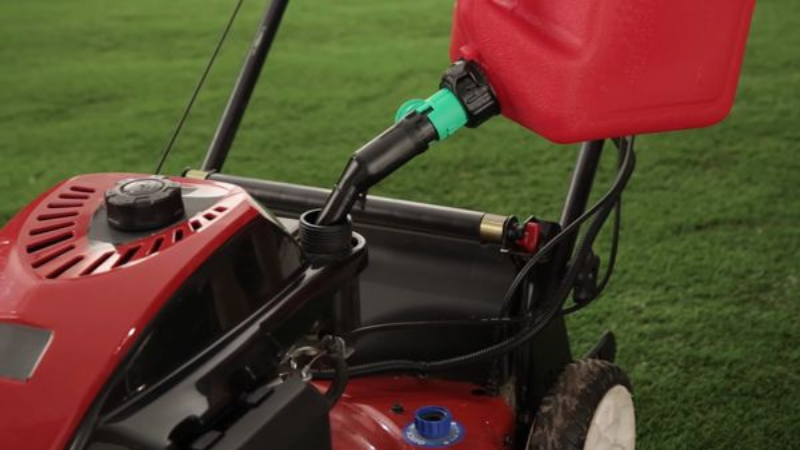
Have you checked the fuel level?
Lack of fuel may also cause this issue as the engine needs more effort to run the mower. Simply fill the fuel tank with an accurate amount of fuel.
3. Old Or Contaminated Fuel
Is your lawnmower fuel sit for several months during the off-season?
Then, the oil may become contaminated. Fresh oil is necessary to run the mower smoothly. Take out the old oil from the tank and add new, high-quality fuel.
4. Spark Plug Issue
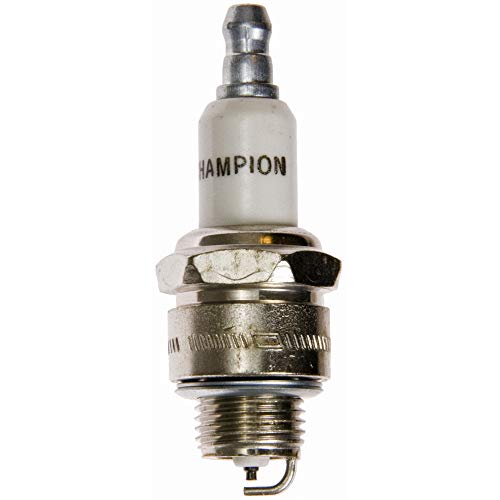

The lawnmower may rev up and down if the spark plug is damaged or having an unbalanced adjustment. You want to make sure the cables connected to the spark plug don’t become loose and move unsteadily in a particular direction.
Apart from that, check inside the spark plug if there are any corrosion build-up issues. If yes, rust can be removed from the surface of the object by using a soft brush.
Correct adjustment is also important as you want to make sure there is an accurate gap. Changing the spark plug is essential if it is damaged.
5. Incorrectly Adjusted Carburetor
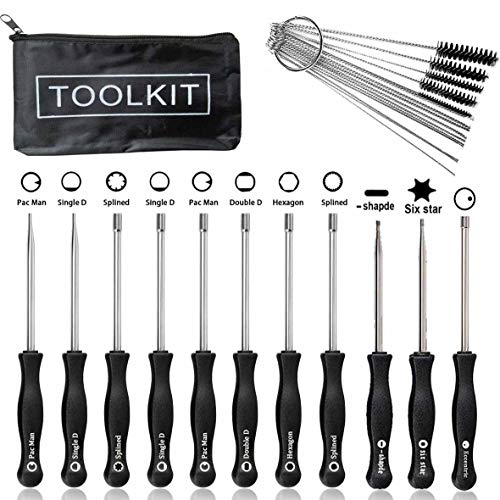

If you fail to adjust the carburetor correctly, your lawnmower may rev up and down after a certain time. You can change the carburetor setting on most lawnmowers by adjusting the two screws.
One screw adapts the fuel-air mixture while the other screw controls the perfect level of speed for a lawnmower. If you are not much knowledgeable about the system, you want to check out the instruction manual.
Follow it carefully. First, tighten the screw normally and run the machine for a few minutes. After that, adjust the screw position as per the engine requirement.
So, these are all the possible reasons for this question: why is my lawnmower revs up and down?
Why Does My Lawn Mower Keeps Surging?
If your lawnmower surges occasionally, you have no reason to panic. But if it is continually surging while using it, then something is wrong.
Though you are not facing any issue in mowing grasses, the annoying sound makes you wonder, “Why does my lawnmower keep surging?”
This could happen for various reasons, such as
| No | Causes |
|---|---|
| 1 | Vacuum Leaks |
| 2 | Fuel System Problems |
| 3 | Dirty Carburetor |
| 4 | Clogged Air Filter |
1. Vacuum Leaks


A loose carburetor lets the crevices between the items will draw in air and creates blockage issues. Gas and air ratios will be unbalanced due to the excess air.
The fuel and air will fail to move freely and adequately due to this issue. It will ultimately affect the engine performance negatively.
To eliminate the issue, make sure you tighten the bolts and air intake manifold properly.
2. Fuel System Problems
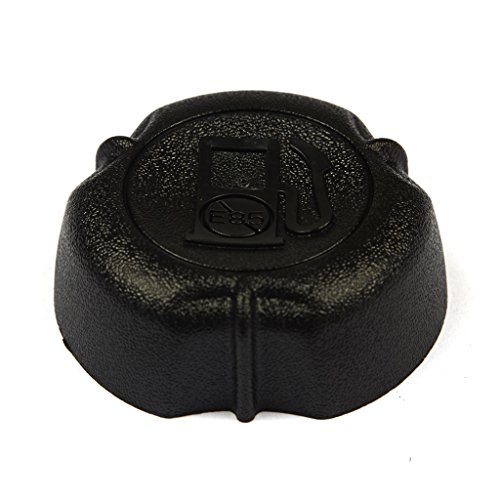

There is a small hole in the fuel tank cap, which permits aeration from the lid to the tank. This increases fuel delivery to the carburetor by creating backpressure.
If dust or dirt gets into this hole, it can block it. Therefore, insufficient fuel will cause the carburetor to surge.
What’s more, it is also possible to experience a surge if water is present in your fuel. On a red-hot summer day or torrential rain, gasoline can accumulate moisture as a result of condensation.
Here are the steps you want to follow in dealing with this issue.
- Your gas tank cap has a vent. Check it out and do a proper cleaning if it has become dirty.
- Remove the gas cap and drain the tank. Also, do a clean-up for the gas bowl and include new fuel. Alternatively, cleaning the fuel tank is also okay by injecting a fuel cleaner.
- Check out your lawnmower performance after replacing the fuel or cleaning the fuel tank.
Noted: Under no circumstances should the fuel gauge be above maximum.
3. Dirty Carburetor


Try this carburator cleaning kit.
Among many causes that promote surging issues, a dirty carburetor is one of the most common issues. A carburetor’s internal components can become clogged with grime and dirt. Fuel cannot flow correctly because it is blocked.
Taking to a nearby garage shop is a perfect solution to clean your dirty carburetor. However, if you’re experienced with repairs, it’s possible for you to do it yourself. Follow these steps:
- Take out the carburetor from the engine. Disassemble all the detachable parts of the carburetor carefully. If you can, remove other closed parts of the carburetor to clean them.
- Use an effective carburetor cleaner for deep cleaning. Make sure you give more focus on needle valves, orifices, and ports.
- If the condition of the carburetor is too bad, replacing it is the best solution.
- After cleaning the carburetor deeply, reassemble each part correctly and tighten the bolts and nuts properly.


4. Clogged Air Filter
Often a lawnmower keeps surging if the air filter is not clear. Mower engines need oxygen for combustion to run, so dirty hay depletes it of oxygen.
If the air filter is heavily damaged, you want to replace it. But a normal clogged air filter can run in a smooth manner if you clean it properly.
Here are the steps:
Step 1 – Disconnect The Cables
First of all, the cable of the spark plug should be disconnected. It is essential to go through all the necessary degrees of safety whenever you perform any maintenance or repair task. By doing so, injuries are prevented from occurring.
Step 2 – Take Out The Air Filter
Take out the air filter and its cover from the engine.
Step 3 – Wash The Air Filter
First, give your hands on the foam filter and wash it with soapy water. Let it dry after washing. After drying it completely, make a light engine oil coating over on the foam filter surface. It will prevent dirt or grease from coming into the carburetor.
Step 4 – Replace If Required


However, replacing your lawnmower with a paper filter will be a better option when it is excessively dirty, which prevents you from seeing the light. Before installing a new filter, remove all dirt from the housing.
These four reasons could be the main culprit about “Why does my lawnmower keep surging?”
What Causes An Engine To Hunt And Surge?

There are many reasons why engines perform poorly, including maintenance problems. And differents engine surge for various reasons. If you notice the issue pops out on your lawnmower machine, you want to test some important parts or systems of the engine.
What causes an engine to hunt and surge?
It is imperative to get the right mixture of air and fuel, perfect spark timing, and effective exhaust management that results in good engine performance. The system will surge if any of these parameters are out of range.
Here we are mentioning the primary causes of “What causes an engine to hunt and surge?”
1. Parameter Hunting
“Parameter hunting” is essentially what fuel-injected engines do when a surging condition arises. Remember, an engine’s ECM will not monitor an engine parameter that is outside its expected range. As a result, all these factors will be adjusted automatically to ensure that everything is in line again
“Parameter hunting” is an experimental method. Whenever the engine loses power, the system tends to overcompensate with excessive fuel or an insufficient timing advance. Almost all surging issues stem from the falling/extreme compensation cycle.
2. Idle Speed Control Issues
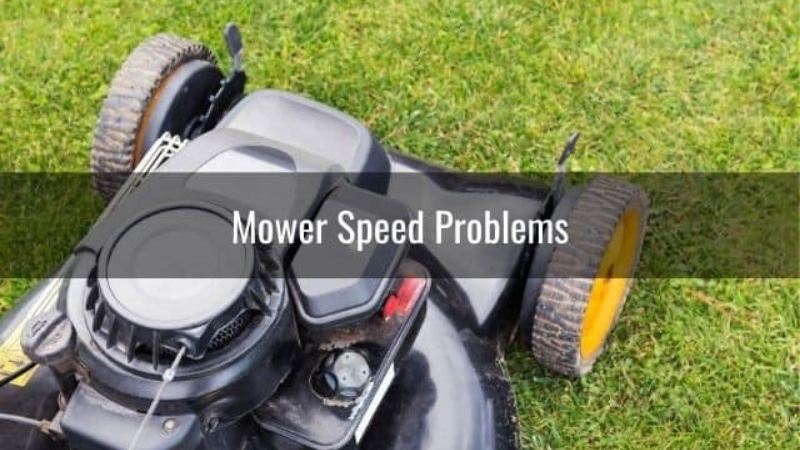
Some lawnmowers may have idle speed control problems. The machine may surge at idle or run at low speeds if idle speed control becomes damaged or faulty.
This issue mainly occurs due to the development of carbon. A throttle plate is stopped from bypassing air because of it.
3. The Ignition System
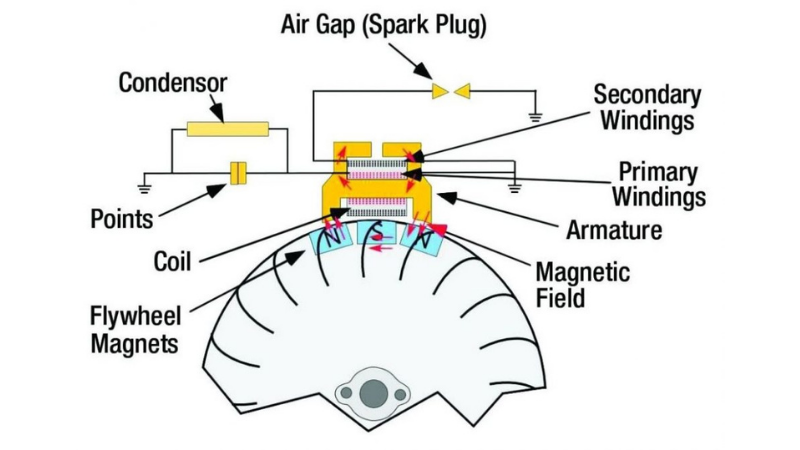
Have you checked out if your mower ignition system is okay? Surging may encounter a foul pickup coil, which is located inside the distributor.
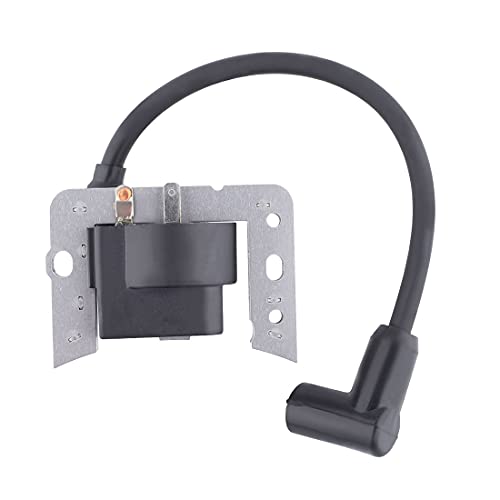

It may fail to function properly at idle or anytime you run the mower. Consult with an expert and replace any important parts if necessary.
4. The Fuel Pressure Regulator
If the fuel pressure regulator is damaged or fouled, it will fail to supply the right pressure and fuel to the engine. In the case of prolonged surges, the issue will become worse.


Don’t forget to change the fuel filter regularly when the schedule comes. Plus, make sure your lawnmower engine is running on with the correct fuel pressure.
You can check out the instruction manual where it is instructed how much your lawnmower needs in a particular situation.
Apart from that, a damaged fuel injector can also cause the engine to surge. In that case, you want to repair or replace the fuel injector as early as possible. It is always a rule of thumb to check the internal lawnmower component to know if any visual changes occur.
5. Bad Valve
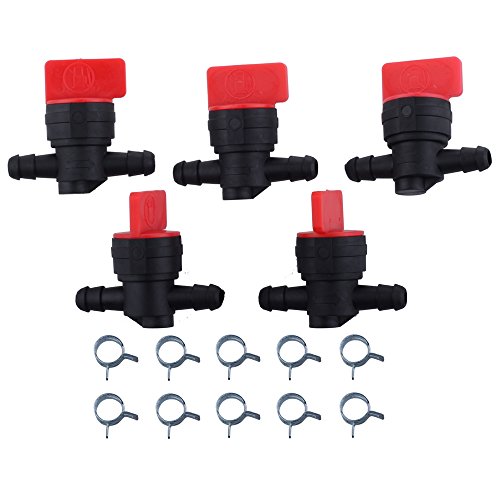

Have you checked out whether your
is okay or not?If your lawnmower has a bad valve, you can learn it in various ways, including oil leakage, struggle to start, rough running, inefficient fuel consumption, etc. Make sure you address the issue soonest.
Hopefully, you have learned all the important causes about “What causes an engine to hunt and surge?”
How Do You Fix An Idle Surge?

It is possible that a lawnmower is idling erratically because of the accumulation of fuel varnish or carbon deposits. Under this circumstance, you want to clean the valve.
Cleaning the dirty valve requires a deep cleaner for effective cleaning. You can use an engine top cleaner or aerosol throttle cleaner for it. After cleaning it, hopefully, you will stop wondering, “How do you fix an idle surge?”
Here is the perfect way to do it:
- First of all, separate the connection between the throttle body and the air injector.
- Next, you want to run on your mower and increase the idle speed gradually.
- Put a small amount of throttle cleaner on the choke body throat
- Boost the cleanliness of this area by spraying the solution for a few seconds.
- Let the cleaner soak into the passageway by turning the engine off.
- Let three minutes pass.
- Start the mower machine again and continue doing the cleaning several times.
- If you don’t see any improvement, consider removing the valve from the machine and clean it properly.
- If you still see an idle surge, take your mower to a nearby store to fix the issue.
So, this is the perfect way to know about “How do you fix an idle surge?”
Can Spark Plugs Cause Surging?
If your lawnmower is surging, it may happen due to combustion issues. Both spark plugs and ignition systems play a crucial role in effective and smooth lawnmower performance.
Can spark plugs cause surging?
If your lawnmower spark plug has become damaged, faulty, or dirty, it may cause surging issues. An individual cylinder’s combustion chamber receives current from its spark plug wires via the ignition coil. A compressed air/fuel mixture is ignited with an electrical impulse transmitted via the plug.
1. Dirty Spark Plugs


If your lawnmower spark plugs become dirty, it will cause surging problems. You will notice a fluctuation in speed while running the mower.
Spark plugs are not firing at the right rate, so these surges are caused by unfired fuel in your engine. Because of it, there is an uneven pace.
Safety is at stake in this problem because your controlling ability on your lawnmower is reduced due to this issue.
If you know how to clean a lawn mower spark plug, do it after inspecting its conditions. If you don’t know, a mechanic must be consulted to address surging and lagging immediately.
2. Bad Spark Plugs
Spark plugs and pistons are part of each cylinder in a lawnmower. With different spark plug styles, different voltages are required for combustion.
Electrons travel through the ignition process, and when they cross the gap between the plugs, they ignite the fuel mixture.


The amount of voltage required for the smooth operation depends on several factors, including engine compression and electrode condition.
Every piston must hit the same spot in the cylinder before sparking occurs. Spark plugs do not produce any heat, yet they play a major role in eliminating unnecessary heat from the combustion area.
But if the lawnmower spark plug becomes bad, it may misfire and can also cause surging. You want to note down these two important points when you want to know about “Can spark plugs cause surging?”
How To Prevent Lawnmower Surging?
No matter how careful you are, you can’t keep your lawnmower problem-free in a lifetime. After a particular time, it will show unwanted issues. A little bit of caution will prevent the problem from occurring quickly. The same goes for surging problems too. Here we are mentioning some important tips to avoid lawnmower surging.
- Regularly inspect your lawnmower air filter and clean it properly when it becomes dirty.
- It is important to check various parts of the lawnmower periodically for proper maintenance.
- Never use low-quality, bad, incompatible, or too old fuel for your lawnmower.
- Ensure there is no issue with the gas cap and free air entering the gas tank.
- Make a schedule for cleaning the spark plug and carburetor for each season. If you use the mower heavily each season, you want to do for 2-3 times.
Final Verdict
Are you still thinking about “Why is my lawnmower revs up and down?” We got you covered everything about this topic, and hopefully, you have figured the root causes why your lawnmower revs up and down. Thanks for reading!
Last update on 2023-01-28 / Affiliate links / Images from Amazon Product Advertising API
 |
 |
 |
 |

About Lee Safin
Lee Safin was born near Sacramento, California on a prune growing farm. His parents were immigrants from Russia who had fled the Bolshevik Revolution. They were determined to give their children a better life than they had known. Education was the key for Lee and his siblings, so they could make their own way in the world. Lee attended five universities, where he studied plant sciences and soil technologies. He also has many years of experience in the U.S. Department of Agriculture as a commercial fertilizer formulator.
Thoughts on "Why Is My Lawnmower Revs Up And Down? How Do You Fix An Idle Surge?"
 |
 |
 |
 |
Get FREE Gardening Gifts now. Or latest free toolsets from our best collections.
Disable Ad block to get all the secrets. Once done, hit any button below
 |
 |
 |
 |